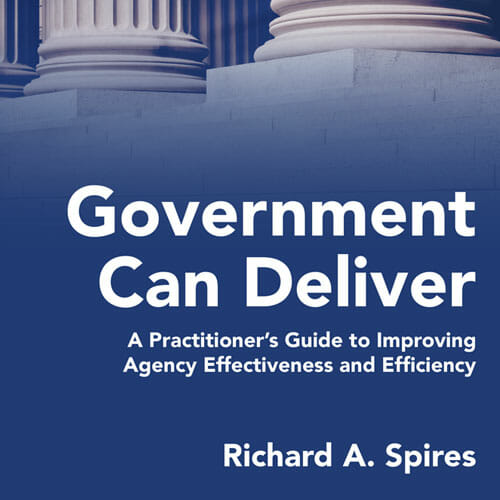$0.00
Description
Key Takeaways from Chapter 1: Government Effectiveness
Many government agencies fail to act effectively and efficiently, both in everyday operations and in crises. This dysfunction has led to a significant loss of trust in our government.
Government inefficiency is rooted in issues in four main problem categories:
- Leadership tenure, expertise, and experience
- Planning and resource alignment
- Program and operational management and oversight
- Resilience and security.
The leadership challenges that affect an agency’s performance can be summed up in three separate, but related, aspects of leadership and management: tenure; the amount of time in the job; expertise, or the existence of relevant knowledge and competency about the function or mission that the leader is responsible for; and experience, or the existence of relevant experiences in different situations. These three are somewhat interdependent, but all three impact the ability of a leader to be effective.
Change—even positive change—is never easy to implement. Almost any strategic plan calls for significant change in how an agency will operate over time. So many leaders, even seasoned leaders, significantly underestimate what that change entails and how difficult it can be to make such change.
To effect positive change through zero-based budgeting, every sub-agency and organization of an agency should justify every line of its budget each year. The inference is that if a line item cannot be justified, it should be significantly reduced or even eliminated.
Due to a lack of proper professional development in program management, there is neither the pipeline of talent needed in government, nor the career paths in which individuals can get the range of experiences required to prepare them to manage large programs effectively.
Resilience is key to any agency’s ability to manage through a crisis. It is defined as “the capacity to recover quickly from difficulties,” which rests on three capabilities: mitigation of risks, proper pre-planning for crises, and good decision-making during a crisis.
The best approach to improve issues in these four problem categories is to focus attention on eight solution functions that, in combination, can provide a framework for agency improvement:
- People – The Solution Starts with the Employees
- Good Governance – Key Ingredient in Good Decision-Making
- Strategic Planning – Beyond a Vision and Goals
- Budget Formulation and Execution – Who Holds the Purse Strings?
- Procurement – Focus on Value
- Program Management – The Engine for Driving Change
- Operations – Making it Better Every Day
- Resilience and Security – Planning for the Bad Day that Will Come.
By focusing on these eight solution functions to address the four problem categories, it is possible to effect positive and profound change!

